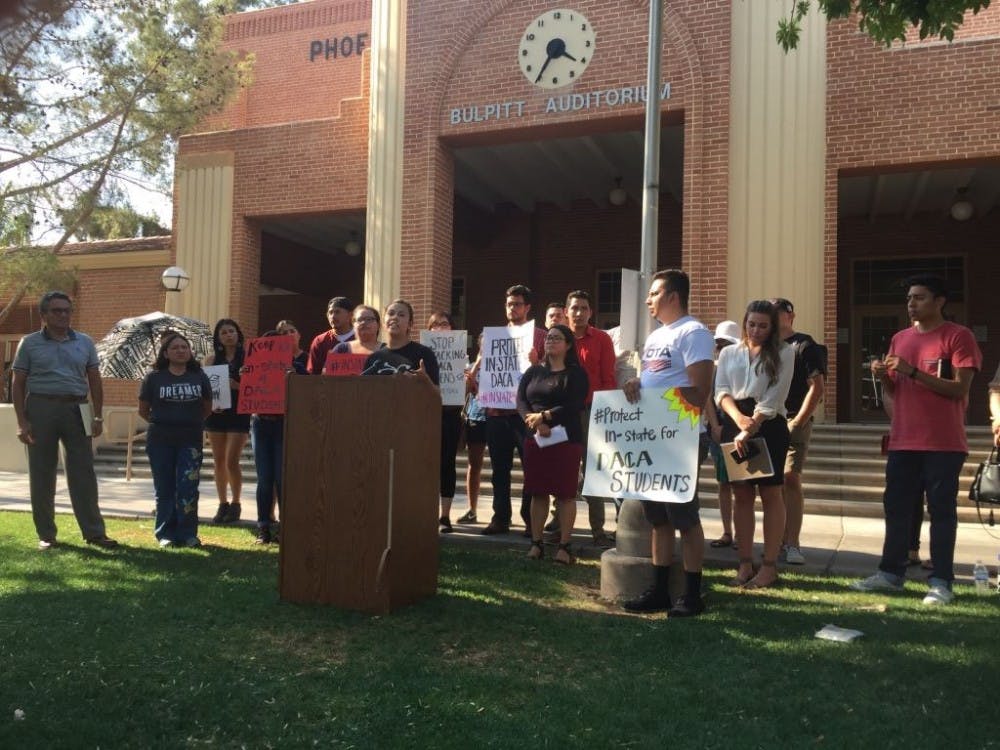Update, 6/29/17: On Thursday, June 29, the Arizona Board of Regents convened in a special session to discuss their response to the Arizona Court of Appeals decision. ABOR decided to continue offering in-state tuition to DACA recipients while the court case, Arizona v. MCCCD, is reviewed by the courts. Regent Jay Heiler opposed the motion stating he did not feel it was appropriate while the Court of Appeals ruling stood but expressed sympathy and noted continued communication by ABOR to the federal administration supporting DACA students. The letter was sent on December 9, 2016.
This past Tuesday, the Arizona Court of Appeals Division One ruled that students under the Deferred Action for Childhood Arrivals program are ineligible for in-state tuition, a move that could affect hundreds of students at ASU.
The State of Arizona v. Maricopa County Community College District, et. al decision states that DACA recipients are not lawfully present and that Congress allows states like Arizona to decide not to give in-state tuition to those who aren’t lawfully present through laws such as Proposition 300 in 2006.
Arizona Attorney General Mark Brnovich, whose office appealed the Maricopa County Superior Court decision granting in-state tuition to DACA recipients in 2015, states that "Proposition 300 passed with over 70 percent of the vote, and it included eligibility standards for in-state tuition. I am sympathetic to all young adults looking to improve their lives, but as Attorney General my job is to defend the law and not second guess the will of Arizona voters."
This case could affect around 500 current students at ASU, according to Karina Ruiz, an ASU alumna and the president of the Arizona Dream Act Coalition which is an immigrant youth-led organization that works on higher education and immigrant rights issues.
ASU media relations said they were referring all questions to the Arizona Board of Regents.
The cost of tuition and mandatory fees for an in-state student for the 2017-2018 year will be two and a half times cheaper than the non-resident tuition rate.
However, ABOR promotes in its statement that there is an option for non-residents who graduated high school in Arizona which allows them to pay 150 percent of in-state tuition.
Ruiz said this is not sufficient.
“We are asking that they stick with the 100 percent,” Ruiz said. "We are not eligible for state financial aid. And as it is, it is a hardship for our students to be able to manage having one or two jobs to be able to pay for school, and the scholarships that are out there are not sufficient for the amount of students that are enrolled... For example, for me, it took me 12 years because I had to leave from school because I could not afford it for four and a half years."
Outreach and Retention Director Edder Martinez for the Undocumented Students for Educational Equity at ASU, a student organization focusing on advocacy, community building and providing resources for undocumented and DACA students at ASU, agrees with Ruiz.
“Personally, I was planning on graduating in May 2018. With this decision, I don’t think I will be able to do that,” Martinez says.
Further, Ruiz, Martinez and ABOR suggest that there are potentially thousands of future students that could be affected as they graduate high schools in the coming years.
For current students, there are several organizations offering support.
The Council of Presidents representing the graduate and undergraduate student governments at the Downtown, Polytechnic, Tempe and West campuses issued a statement on Friday pledging to initiate conversations with USEE at ASU, the Council of Coalitions and ASU administrators on the matter and listing support services.
Jesse Avalos, the vice president of the ASU Young Democrats, states that the group wants “(DREAMers) to receive in-state tuition funding and we want them to have the same opportunities as every other college student in America.”
Avalos said the ruling “is making the American Dream more of a bureaucratic nightmare for (DREAMers).”
“For the most part, right now the ASU Young Democrats want to make sure we are as supportive and we’re as on board with DACA students especially in this time right now,” Avalos said.
Ruiz and Martinez says the current focus is on the MCCCD Governing Board meeting on Tuesday where the MCCCD Board will decide on whether to appeal the court ruling and continue providing in-state tuition for its DACA students.
For now ABOR has not made any decisions on the policy at ASU and other public universities, but states that its policies are subject to applicable law.
Reach the reporter at raboyd@asu.edu or follow @RyanAndrewBoyd on Twitter.
Like The State Press on Facebook and follow @statepress on Twitter.




